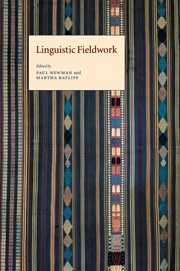Book contents
- Frontmatter
- Contents
- List of figures
- List of tables
- Notes on contributors
- Introduction
- 1 Fieldwork as a state of mind
- 2 Who shapes the record: the speaker and the linguist
- 3 Places and people: field sites and informants
- 4 Ulwa (Southern Sumu): the beginnings of a language research project
- 5 Escaping Eurocentrism: fieldwork as a process of unlearning
- 6 Surprises in Sutherland: linguistic variability amidst social uniformity
- 7 The role of text collection and elicitation in linguistic fieldwork
- 8 Monolingual field research
- 9 The give and take of fieldwork: noun classes and other concerns in Fatick, Senegal
- 10 Phonetic fieldwork
- 11 Learning as one goes
- 12 The last speaker is dead – long live the last speaker!
- Index
2 - Who shapes the record: the speaker and the linguist
Published online by Cambridge University Press: 05 June 2012
- Frontmatter
- Contents
- List of figures
- List of tables
- Notes on contributors
- Introduction
- 1 Fieldwork as a state of mind
- 2 Who shapes the record: the speaker and the linguist
- 3 Places and people: field sites and informants
- 4 Ulwa (Southern Sumu): the beginnings of a language research project
- 5 Escaping Eurocentrism: fieldwork as a process of unlearning
- 6 Surprises in Sutherland: linguistic variability amidst social uniformity
- 7 The role of text collection and elicitation in linguistic fieldwork
- 8 Monolingual field research
- 9 The give and take of fieldwork: noun classes and other concerns in Fatick, Senegal
- 10 Phonetic fieldwork
- 11 Learning as one goes
- 12 The last speaker is dead – long live the last speaker!
- Index
Summary
With the accelerating loss of linguistic diversity in our world, it is a time for serious thought about how to record as much as possible of the richness still around us. In many cases what we choose to document may be the principal record of an entire linguistic tradition, both for the descendants of the speakers and for others seeking to understand the possibilities of the human mind. It is a time to consider not only how to fill recognizable gaps in current knowledge, but also how to provide the basis for answers to questions we do not yet know enough to ask. In most cases, these goals can best be met by a mix of styles of collaboration between speakers and linguists. The product of fieldwork will ultimately be shaped not only by the nature of the language, but also by the methodologies chosen, by the roles assumed by the speakers, and by the preparation and sensitivity of the linguist.
Methodology
The record that results from linguistic fieldwork depends of course on the goal of the particular project, which in turn determines the kinds of methodologies that will be effective. The goal may be quite specific, such as understanding patterns of vowel harmony. It may be as ambitious as the documentation of an entire language in as much depth as possible.
- Type
- Chapter
- Information
- Linguistic Fieldwork , pp. 34 - 54Publisher: Cambridge University PressPrint publication year: 2001
- 19
- Cited by



